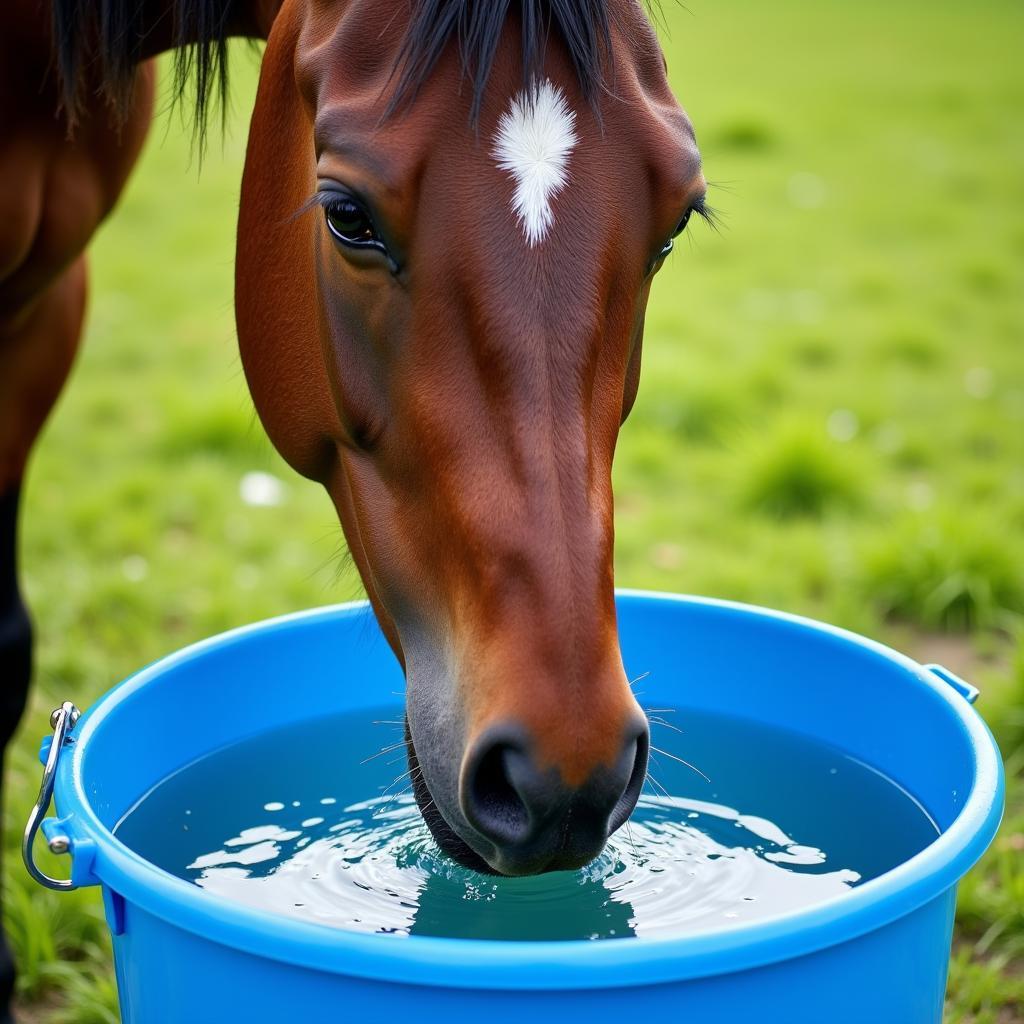A horse’s need for water is paramount for its survival and well-being. Understanding how long a horse can live without water is crucial for responsible horse ownership. This article delves into the factors influencing a horse’s hydration needs and the serious consequences of dehydration.
The Importance of Water for Horses
Water is essential for virtually every bodily function in a horse. It regulates body temperature, aids digestion, lubricates joints, and transports nutrients. Without sufficient water intake, a horse’s health can rapidly decline. Just like humans, horses can survive longer without food than without water. A horse’s daily water intake varies based on factors such as workload, weather conditions, diet, and overall health. A working horse in hot weather will require significantly more water than a horse at rest in a cool climate. For example, a horse participating in intense training might need twice the amount of water compared to a pasture-kept horse on a mild day. Access to a horse bucket filled with fresh, clean water is essential.
Horses can exhibit signs of mild dehydration even after a few hours without water. These signs include lethargy, dry mucous membranes, and decreased urine output. More severe dehydration can lead to colic, organ damage, and even death. Providing access to fresh, clean water at all times is the best way to prevent dehydration.
 Horse Drinking Water from a Bucket
Horse Drinking Water from a Bucket
Factors Affecting Water Intake
Various factors influence how much water a horse drinks. Ambient temperature plays a significant role, with horses needing more water in hot weather to compensate for fluid loss through sweating. Diet also affects water intake. Horses on dry hay require more water than those on lush pasture, which has a higher water content. Exercise increases water requirements due to sweating and increased respiration. Finally, a horse’s individual health status can influence water needs. Ill or pregnant horses often require more water.
Understanding how these factors interplay is crucial for determining the appropriate amount of water for your horse. Regularly monitoring your horse’s water consumption can help identify potential problems early on. Providing electrolytes during hot weather or after strenuous exercise can also help maintain proper hydration.
How Long Can a Horse Go Without Water?
The maximum time a horse can survive without water is generally considered to be around 3-6 days. However, this is a dangerous limit, and severe health consequences can occur much sooner. Even a few hours without water can lead to noticeable signs of dehydration. After 24 hours, dehydration becomes a serious concern, and after 48 hours, the risk of life-threatening complications significantly increases. It’s crucial to provide your horse with consistent access to fresh water, especially during hot weather or after exercise.
Signs of Dehydration in Horses
Recognizing the signs of dehydration is vital for prompt intervention. Early signs include lethargy, reduced feed intake, and dry mucous membranes. As dehydration progresses, the skin loses its elasticity, the eyes become sunken, and the heart rate increases. In severe cases, colic, kidney failure, and even death can occur.
Knowing how to perform the skin pinch test can help you quickly assess your horse’s hydration status. Pinch a fold of skin on the neck or shoulder; if it takes longer than a few seconds to return to its normal position, the horse may be dehydrated. Contact your veterinarian immediately if you suspect your horse is dehydrated. They can provide appropriate treatment, which might include intravenous fluids and supportive care.
Preventing Dehydration: Essential Tips
Preventing dehydration is the best approach to equine health. Always ensure your horse has access to driving bits for horses and fresh, clean water. Check water sources regularly for cleanliness and functionality, especially automatic waterers. Increase water availability during hot weather and after exercise. Consider adding electrolytes to the water during periods of increased stress or exertion. Monitor your horse’s water intake and consult a veterinarian if you notice any changes in drinking habits.
Dr. Emily Carter, DVM, Equine Specialist, emphasizes, “Providing constant access to fresh, clean water is the single most important thing you can do to prevent dehydration in your horse. It’s a simple step with profound implications for their health and well-being.”
Conclusion
Knowing how long a horse can live without water is critical for every horse owner. While the theoretical maximum is a few days, even short periods without water can negatively impact a horse’s health. Prioritizing hydration through regular monitoring and proactive measures is paramount to ensuring your horse’s well-being.
FAQ
- How much water does a horse need daily? The average horse drinks 5-10 gallons per day, but this can vary significantly.
- What are the signs of severe dehydration in a horse? Sunken eyes, loss of skin elasticity, increased heart rate, colic, and kidney failure are signs of severe dehydration.
- How can I encourage my horse to drink more water? Adding electrolytes or flavoring to the water, providing multiple water sources, and ensuring water is always fresh and clean can encourage drinking.
- Can a horse drink too much water? While rare, horses can overdrink, leading to water intoxication.
- What should I do if my horse won’t drink? Contact your veterinarian immediately if your horse refuses to drink.
- Is it okay to give my horse tap water? Generally, yes, but ensure the water quality is suitable for consumption.
- How often should I clean my horse’s water bucket? Daily cleaning is recommended to prevent bacterial growth.
Further Exploration
You might also be interested in our articles on miniature horse muzzle and horse riding cooling vest. Also, check out our schedule for the humboldt county fair horse racing schedule.
For any assistance, please contact us at Phone: 0772127271, Email: [email protected], or visit our address: QGM2+WX2, Vị Trung, Vị Thuỷ, Hậu Giang, Việt Nam. We have a 24/7 customer service team.